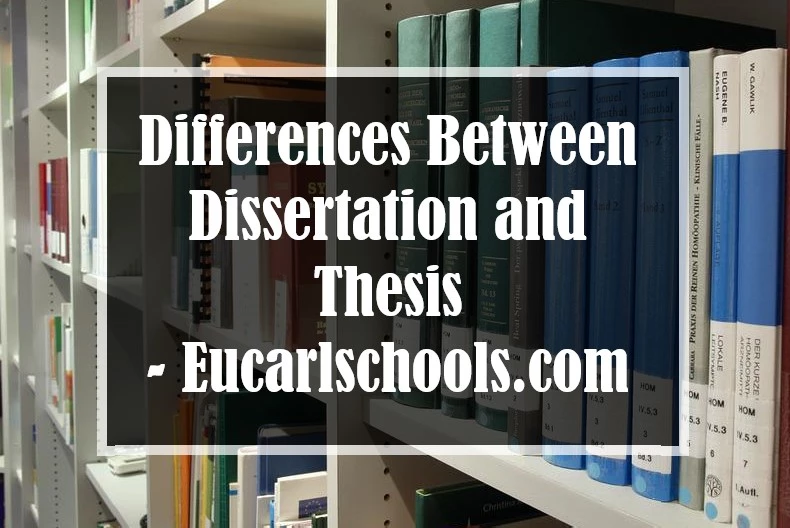Differences Between Dissertation and Thesis
Are you condused and probably can tell the Differences Between Dissertation and Thesis? Read on. Finishing off as an undergraduate leaves you with many options, and one very common one that is usually latched onto these days is getting a Masters’s degree and if possible going all the way to a Doctorate programme.
Whichever the case may be, the reality is that if one is ever going to further his education in a particular field of study past the Bachelor’s degree, it would be absolutely necessary to take on research-based projects totally different from the ones in the undergraduate days.
What are a Dissertation and Thesis?
You most likely would have heard about the Dissertation and Thesis. It wouldn’t have been difficult if people never did use them interchangeably, but, it turns out the major reason why so many people are confused is that, in one vein, someone talks about needing to get a dissertation done for his Master’s programme, another questions whether it is a thesis he was actually talking about.
It turns out both persons are right on the money. I know you are quite surprised to have seen that written. It is all a matter of location. In British nations, the project work required for a Masters’s degree is called a dissertation and what is needed for a PhD programme is a thesis.
They are however reversed in American nations. The project to be done after thorough research is called a thesis at a Masters’s level and upon completion of one PhD programme, you must have done a dissertation.
With that being said, dissertations and theses are terminal academic papers that focus on a particular subject matter and demonstrate either mastery or contribute to the development of the body of knowledge in the field of study.

Similarities Between Dissertation and Thesis
That being said, whichever way it is being called, there are structural differences that need to be outlined to avoid mix-ups. However, it must be said that there are similarities shared between these sets of assignments and it certainly wouldn’t be inappropriate to have them outlined.
Read Also: 20 Oldest Universities In The World
They include:
- Both the Dissertation and Thesis are considered final project work as the case may be.
- To produce either a Dissertation and Thesis, a thorough understanding of the subject material must be in place.
- The skill of proficient writing would be highly demanded to execute the project.
- Theses or dissertations must be original and not plagiarized.
- Both papers always have deadline dates to beat.
- Whether it is a Dissertation and Thesis, professional guidance is required to churn out an excellent research paper.
Differences Between Dissertation and Thesis
By the way, for the sake of convenience, we would adopt the way it is being called by British nations, that is, dissertations for a Masters’s degree and theses for PhD programmes.
Kind of Research
The very major difference separating these two papers outside the very many that would be mentioned is the fact that dissertations are made after the conduction of an already existing research whilst for the PhD students in the creation of their theses, they would many of the times be needed to trailblaze research from the get-go and then formulate a hypothesis which must be proven.
This certainly highlights the difficulty in getting Doctorate degrees. Both papers undeniably assess the student’s ability to think critically and produce feasible solutions upon careful analysis.
Length
PhD papers are about two to three times much lengthier than dissertations. Whilst you could have a dissertation run up to at least a hundred pages, a PhD student would report based on his novel research nearly four hundred pages of written work.
Longer Oral Presentation
Normally, it can take many hours to present and answer questions for theses, but, with dissertations, the Masters’s degree student would be called to answer questions for nearly up to an hour. Again, the rigours PhD students have to stick up within these several hours to douse every doubt the panel of professors could have emphasized the difficulty in bagging a PhD.
Longer Processing
A PhD student is faced with the responsibility of not just making a hypothesis but also proving the validity of the assumption. The student after careful observation of the problem proposes a practical solution that must be tested and proven to be true before the professors.
On the other hand, dissertations, it is relatively easy in comparison to theses, as the students take a position amongst the many that have been taken and begin to construct convincing arguments after analysing why such stances are true.
Data Collection
The data required to expertly create these sets of writings, either theses or dissertations differ. For theses, it is important that since it is started out as original research, primary data sources like questionnaires, interviews or even surveys are needed.
With dissertations, secondary data sources like books, articles, and government statistics would suffice. However, it must be stated that the PhD student in preparation for the defence of the thesis could quote some secondary sources.
Purpose of Papers
Dissertations could easily pass for proof to your professors that you have grasped to a great extent the subject matter of interest. The stakes get a lot higher with theses since it is not existing research like the master’s, the PhD student through the writings must contribute to the advancement of the field. Upon award of the Doctorate degree, they must have proven to the body of existing knowledge in that field of study.
Read Also: Meaning of Educationally Less Developed States (ELDS)
Conclusion
Each academic paper whether it is a Dissertation and Thesis, tests the students’ ability to most importantly, critically think and express such opinions as clearly as possible in writing and presentations before a team of faculty members or even industry giants as the case might be.
Generally, these postgraduate degrees require a lot of hard work, energy and time to reproduce an excellent piece of writing. This way definitely ensures mastery of the subject matter has been achieved.






